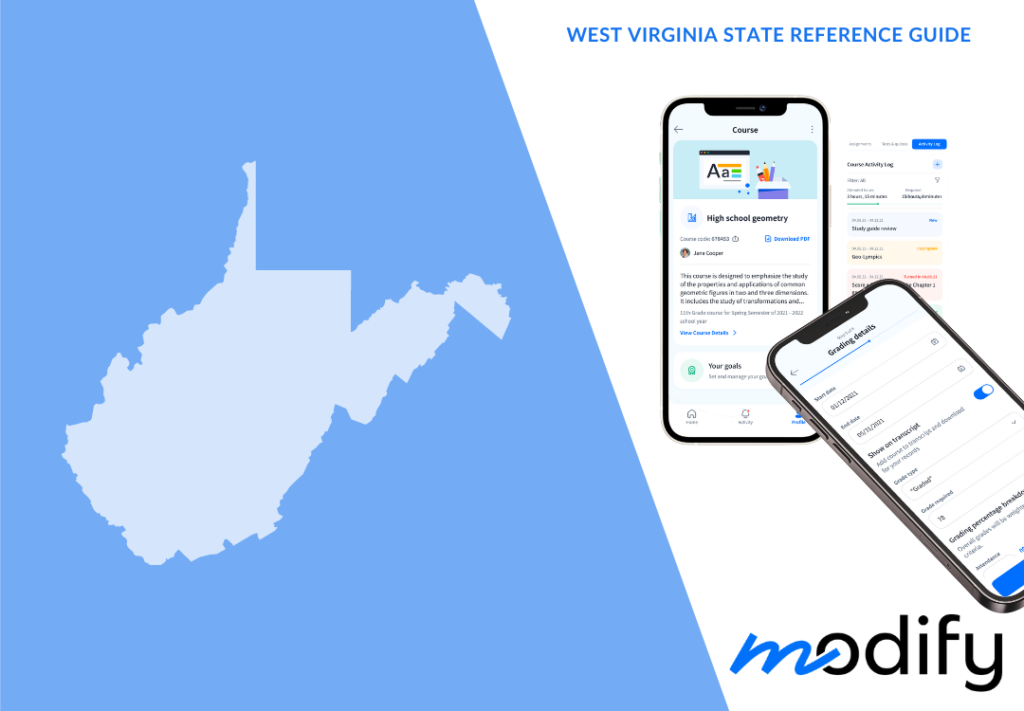West Virginia Homeschool Laws
Homeschooling in West Virginia
How do I start homeschooling?
Families wondering how to enroll in homeschool in West Virginia need to know they have 2 options to legally homeschool in the state.
- Option 1: getting approval from a school board for homeschooling.
- Option 2: submitting a notice of intent
Each of these options has different regulations regarding curriculum choice, record keeping, and credentials. Most homeschooling families in the state choose the second option because it provides them with more flexibility and less restriction.
Modify™ can help you with your tracking, portfolio and record keeping. Download the app today.
Enjoying learning together!
Homeschool Laws
According to West Virginia Statute §18-8-1a, “Compulsory school attendance begins with the school year in which the sixth birthday is reached prior to July 1 of such year or upon enrolling in a full-time publicly funded kindergarten program, and continues to the 17th birthday or for as long as the student continues to be enrolled in a school system after the 17th birthday.”
“A child is exempt from the compulsory school attendance requirement set forth in §18-8-1a of this code if the requirements of either subdivision (1) or subdivision (2) of this subsection, both relating to home instruction, are met” (§18-8-1(c)).
What do I need to be eligible to be a homeschool parent?
If homeschooling in West Virginia, “instruction shall be conducted by a person or persons who, in the judgment of the county superintendent and county board, are qualified to give instruction in subjects required to be taught in public elementary schools in the state” (§18-8-1(1)). Per the West Virginia Code, “The person or persons providing home instruction shall submit satisfactory evidence of a high school diploma or equivalent, or a post-secondary degree or certificate from a regionally accredited institution or from an institution of higher education that has been authorized to confer a post-secondary degree or certificate in West Virginia by the West Virginia Council for Community and Technical College Education or by the West Virginia Higher Education Policy Commission” (§18-8-1(2B)).
Do I need to notify the school district of my intent to homeschool my child?
Yes! “Upon commencing home instruction […] the parent of a child receiving home instruction shall present to the county superintendent or county board a notice of intent to provide home instruction that includes the name, address, and age of any child of compulsory school age to be instructed and assurance that the child shall receive instruction in reading, language, mathematics, science and social studies and that the child shall be assessed annually […]. Upon establishing residence in a new county, the person providing home instruction shall notify the previous county superintendent and submit a new notice of intent to the superintendent of the new county of residence: Provided, That if a child is enrolled in a public school, notice of intent to provide home instruction shall be given on or before the date home instruction is to begin” (§18-8-1(2A)).
What educational options are available to my homeschooler?
You do have options for the home education of your child, including participation in some school district programs and services. For example, “The county superintendent or a designee shall offer such assistance, including textbooks, other teaching materials and available resources, all subject to availability, as may assist the person or persons providing home instruction. Any child receiving home instruction may upon approval of the county board exercise the option to attend any class offered by the county board as the person or persons providing home instruction may consider appropriate subject to normal registration and attendance requirements” (§18-8-1(3)).
Homeschool Requirements
Even though West Virginia does not highly regulate homeschooling, there are some West Virginia homeschool requirements you must satisfy when you homeschool:
- Begin homeschooling by age 6.
- File the required notice of intent to provide home instruction upon beginning home instruction.
- Provide instruction “in the home of the child or children or at some other place approved by the county board and for a time equal to the instructional term set forth in §18-5-45 of this code (see below)” (§18-8-1(1)).
- Provide instruction in the following required subjects: reading, language, mathematics, science and social studies (§18-8-1(2A)).
- Arrange for the annual assessment of your child (§18-8-1(2A)) and “submit to the county superintendent the results of the academic assessment of the child at grade levels three, five, eight and 11, as applicable, by June 30 of the year in which the assessment was administered” (§18-8-1(2E)).
- “Notify the county superintendent upon termination of home instruction for a child who is of compulsory attendance age” (§18-8-1(2A)).
- Stay current with homeschooling laws and requirements.
Per §18-5-45(c2), an “instructional term” for students is defined as “no less than one hundred eighty separate instructional days.” Within this instructional term, an “instructional day” meets the following criteria:
“Instruction is offered to students for at least the minimum number of minutes as follows:
- For early childhood programs as provided in subsection (d) section forty-four of this article [§18-5-44];
- For schools with grade levels kindergarten through and including grade five, 315 minutes of instructional time per day;
- For schools with grade levels six through and including grade eight, 330 minutes of instructional time per day; and
- For schools with grade levels nine through and including grade twelve, 345 minutes of instructional time per day” (§18-5-45 (a1A)).
Do I need to administer testing to my homeschooler?
In accordance with §18-8-1(2C), “Annually, the person or persons providing home instruction shall obtain an academic assessment of the child for the previous school year in one of the following ways:
- The child receiving home instruction takes a nationally normed standardized achievement test published or normed not more than 10 years from the date of administration and administered under the conditions as set forth by the published instructions of the selected test and by a person qualified in accordance with the test’s published guidelines in the subjects of reading, language, mathematics, science and social studies. The child is considered to have made acceptable progress when the mean of the child’s test results in the required subject areas for any single year is within or above the fourth stanine or, if below the fourth stanine, shows improvement from the previous year’s results;
- The child participates in the testing program currently in use in the state’s public schools. The test shall be administered to the child at a public school in the county of residence. Determination of acceptable progress shall be based on current guidelines of the state testing program;
- A portfolio of samples of the child’s work is reviewed by a certified teacher who determines whether the child’s academic progress for the year is in accordance with the child’s abilities. The teacher shall provide a written narrative about the child’s progress in the areas of reading, language, mathematics, science and social studies and shall note any areas which, in the professional opinion of the reviewer, show need for improvement or remediation. If the narrative indicates that the child’s academic progress for the year is in accordance with the child’s abilities, the child is considered to have made acceptable progress; or
- The child completes an alternative academic assessment of proficiency that is mutually agreed upon by the parent or legal guardian and the county superintendent.”
“The parent or legal guardian shall submit to the county superintendent the results of the academic assessment of the child at grade levels three, five, eight and 11, as applicable, by June 30 of the year in which the assessment was administered” (§18-8-1(2E)).
“The state board shall develop guidelines for the home schooling of special education students including alternative assessment measures to assure that satisfactory academic progress is achieved” (§18-8-1(1)).
What happens to my child’s annual testing results?
“When the annual assessment fails to show acceptable progress, the person or persons providing home instruction shall initiate a remedial program to foster acceptable progress. The county board upon request shall notify the parents or legal guardian of the child, in writing, of the services available to assist in the assessment of the child’s eligibility for special education services. Identification of a disability does not preclude the continuation of home schooling. In the event that the child does not achieve acceptable progress for a second consecutive year, the person or persons providing instruction shall submit to the county superintendent additional evidence that appropriate instruction is being provided” (§18-8-1(2D)).
Note that “the county superintendent may, after a showing of probable cause, seek from the circuit court of the county an order denying home instruction of the child. The order may be granted upon a showing of clear and convincing evidence that the child will suffer neglect in his or her education or that there are other compelling reasons to deny home instruction” (§18-8-1(2)).
What records do I need to keep when I homeschool my child?
In order to homeschool in West Virginia, there are certain records you are required to maintain. According to §18-8-1(1), “The person or persons providing the instruction, upon request of the county superintendent, shall furnish to the county board information and records as may be required periodically with respect to attendance, instruction and progress of students receiving the instruction.” This includes the requirement to keep copies of your child’s annual assessments for three years (§18-8-1(2D)).
In addition to the required recordkeeping, we also recommend you do some personal recordkeeping to provide verification of education in the event you would need to show some form of educational proof to the state or other legal entities or to prepare for re-entry into public school or postsecondary pathways. This includes the following:
- Attendance
- Immunization records
- Lists of texts and workbooks used
- Student schoolwork samples and/or portfolios
- Test and evaluation results
- Correspondence with school officials
You may also be able to find more information on West Virginia homeschool requirements through your local school district.
Record Keeping
West Virginia homeschool laws stipulate that parents or guardians of homeschooled children must maintain copies of of each student’s academic assessment for three years. In grades 3, 5, 8, and 11, parents must submit the results of the academic assessment to their county superintendent no later than June 30 of the year the assessment was completed.
One of the most effective ways to keep track of all that your homeschooler is accomplishing within a given school year is with a homeschool portfolio.
The Modify™ app makes record keeping simple and keeps all your records organized.
Graduation requirements
West Virginia diploma requirements:
Per West Virginia state education code (§18-8-12), parents determine when their student has fulfilled graduation requirements and can issue their own homeschool diploma; students of private/online schools may receive diplomas from those institutions.
West Virginia high school testing requirements:
Homeschool students are not subject to testing requirements for graduation.
West Virginia high school transcripts:
Homeschool parents may create their own student transcripts, and may include any information they deem pertinent to colleges, military, and/or future workplace organizations.
West Virginia high school course credits:
Parents determine when their student has fulfilled graduation requirements; for the purpose of creating transcripts, some homeschool parents do assign credits to individual courses.
GED eligibility:
Homeschoolers are eligible to take the high school equivalency test once they are 17 years of age. As of 2018, WV law does not require homeschoolers to obtain a GED to be eligible for the state Promise Scholarship.
If you have a child that is college bound it is always a good idea to keep records, portfolios and transcripts, all of these and more can be done on the Modify™ app.






